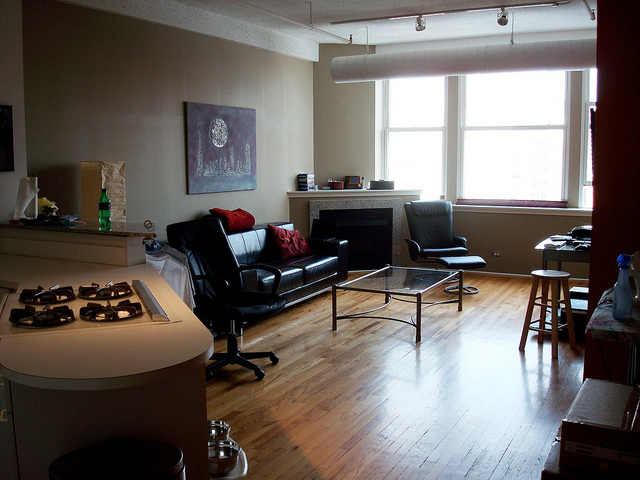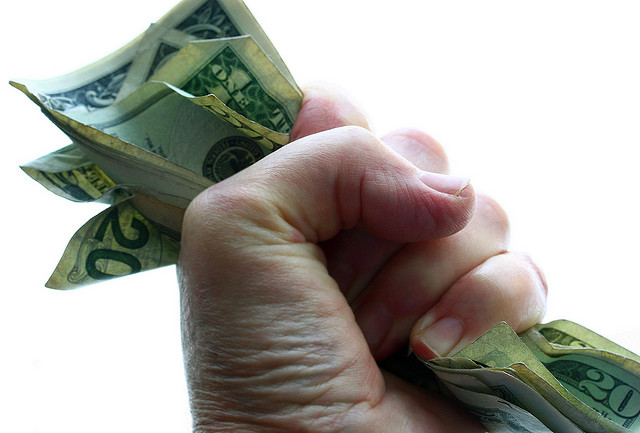5 Ways Student Debt Affects You -- Even If You Don't Have it
By:
I admit it: I was one of the lucky ones. The combination of grants and scholarships I received in college allowed me to graduate from UCLA with no debt. That makes me one of the lucky few: 40 million Americans now have at least one outstanding student loan, and the average balance has risen to $29,000 a head. The sumtotal of student debt nationwide is now up to a staggering $1.2 trillion.
But if you’re like me and you don’t have any student debt to pay off, you might find yourself having empathy for all the people who do—but wondering how it affects you. The short answer is: even if it doesn’t impact your life in a highly tangible, specific way, it still has very meaningful social and economic consequences.
 n.karim / Flickr - flickr.com
n.karim / Flickr - flickr.com
1. A drag on consumer spending.
This isn’t a real surprise: student loan debt has a direct impact on consumer spending. After all, if a portion of your monthly income is going to pay down debt from college, that’s less money you have to spend on other things—especially big-ticket items. Let’s take cars, for example: student loan debt is eating into the market for purchasing new cars, draining an estimated $6 billion annually from the amount of money that might otherwise have gone to car purchases. This is something I can relate to: I bought my first and only car a couple of years after graduating college. If I had had to pay off student loans, I likely either wouldn’t have been able to purchase a car at all or would have had to purchase something significantly less expensive than the new Prius that I bought. And that has consequences across the entire economy.
 daryl_mitchell / Flickr - flickr.com
daryl_mitchell / Flickr - flickr.com
2. It depresses the housing market.
If cars are becoming less affordable because of student loan debt, it only makes sense that home purchases would take a hit too—and for younger buyers, they are. For people with student loan debt, credit is much tighter because lenders are far less willing to issue a home mortgage to borrowers with significant existing debt. And that has a negative impact on the housing market and on home construction—which in turn means fewer available jobs and less spending on, well, everything that goes into building homes. And that can have a significant impact on the economy.
 leyla.a / Flickr - flickr.com
leyla.a / Flickr - flickr.com
3. It depresses “new household formation." (i.e. you can't move out)
Let’s say you have debt, but you’re not even looking to buy a house. You just want to rent your own an apartment, but you can’t even do that because it’s not affordable—so you end up splitting a place with roommates or moving back into your childhood bedroom. You may not think that hurts the economy—but really, it does.
Think about what happens when you get your own place: you have to furnish it. You have to get your own kitchenware, for example, because you’re no longer “borrowing” plates from your roommates or your parents. Perhaps worst of all, you probably have to pay for your own Wi-Fi. In any case, there’s a lot of consumer spending that goes into household formation—and when households aren’t being formed because college graduates can’t afford to get their own places, it has a ripple effect. Household formation averaged 1.5 million a year from 1997-2007, but only 500,000 a year from 2008-2010. Meanwhile, the percentage of young adults who move is at a 50-year low. The worst part is that it’s not getting better: the recession may have ended, but household formation is still “disturbingly low,” according to the Wall Street Journal. Think about what that means for the economy when a million fewer households are being rented or bought and then outfitted and furnished. That’s like applying an emergency brake to economic growth.
.jpg?auto=format&crop=faces&fit=crop&q=60&w=736&ixlib=js-1.1.0) Lori Tingey / Wikimedia Commons - wikimedia.org
Lori Tingey / Wikimedia Commons - wikimedia.org
4. A drain on creativity and entrepreneurship.
Starting a business requires creativity and hard work—but much of the time, it also requires the ability to take on risk. For people with student loan debt, that poses a problem. To begin with, they’ll be less likely to feel comfortable taking on risk if they already have tens of thousands of dollars of debt from college. But even if they are that courageous, the tightness of credit means that it would be much harder for them to get a loan even if they wanted to.
Even if you’re debt free and have no intention of starting a business, that’s an intangible problem. Small businesses account for 60 percent of all jobs, and the innovation and competition created by entrepreneurs is a key part of a functioning, capitalist economy. Someone without debt may not be directly impacted by this, but to use a video game analogy, the combined $1.2 trillion of student loan debt means that the economy is playing on hard mode.
 liz west / Flickr - flickr.com
liz west / Flickr - flickr.com
5. It’s making society worse.
One of the problems of student loan debt? Those who have it feel pressured to make as much money as possible to try to overcome their debt as quickly as possible. That means that instead of doing the things they really want to do—like work for a nonprofit, teach, or make a difference some other way—many people who have significant student debt end up working in high-paying industries like finance instead. This has a moral and social cost. The epidemic of student loan debt is restricting the public service sector to those who either don’t have to worry about money or to those who are so eager to do the work that they’re willing to suffer financially for it. The crushing epidemic of student loan debt, then, results in far fewer young Americans striving to serve the public and make the world a better place, rather than serve the highest bidder simply to get out of debt.
The point is this: even if you don’t have any student debt, you’re still hampered by the crushing weight that others are carrying. It’s slowing economic growth, hamstringing innovation and entrepreneurship, and hollowing out communities.
